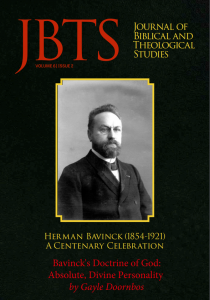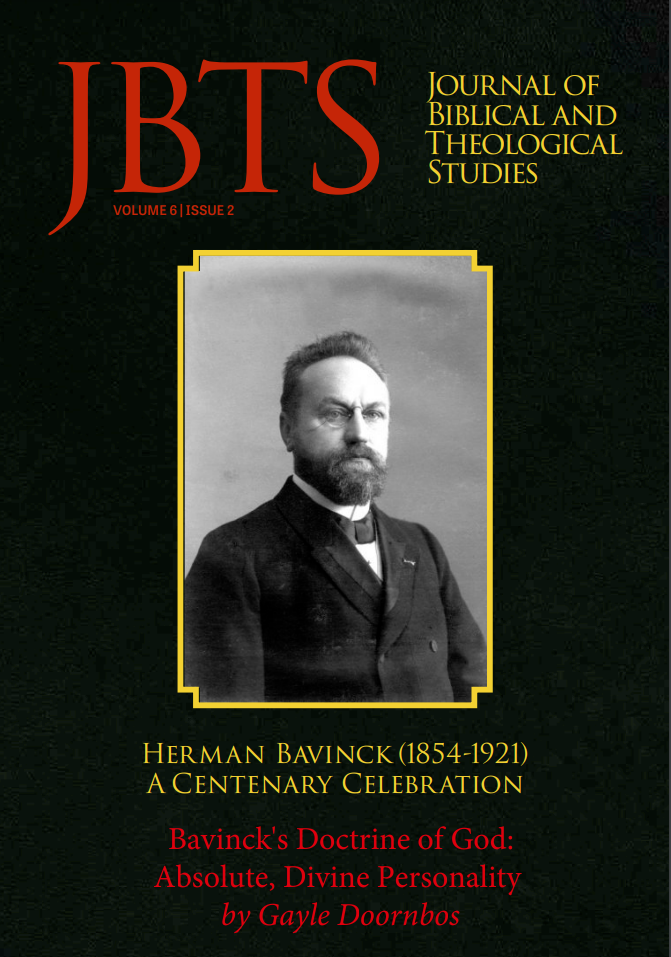Bavinck’s Doctrine of God: Absolute, Divine Personality
Gayle Doornbos
Gayle Doornbos (PhD, University of St. Michael’s College) is an Associate Professor of Theology at Dordt University. She has also taught in Calvin Theological Seminary’s distance program. She lives in Sioux Center, IA.
Introduction[1]
Given the Dutch Reformed Theologian Herman Bavinck’s insistence on the centrality of the doctrine of the Trinity and the serious debates surrounding the doctrine at the turn of the twentieth century, it is surprising that there remain few extended treatments of Bavinck’s doctrine of God within secondary scholarship, especially those situating his theology proper within his theological and philosophical context. While there remains a widespread recognition of the trinitarian nature of Bavinck’s theology as well as examinations of the triniform structure of various doctrines,[2] the structure, shape, sources, and context of Bavinck’s doctrine of God remains underexamined (at best) and unexamined (at worst).[3] Why is this? Syd Hielema’s treatment of Bavinck’s doctrine of God in his 1998 dissertation “Herman Bavinck’s Eschatological Understanding of Redemption” illuminates at least two potential reasons in older scholarship. First, describing the doctrine of the Trinity, Hielema claims that Bavinck’s treatment is “certainly not remarkable or unusual in any way.”[4] Second, describing Bavinck’s development of the divine attributes, Hielema claims that he occasionally lapses into “abstract speculation concerning the nature of God” and “scholastic detours.”[5] While not indicative of all Bavinck scholarship, Hielema’s estimation of Bavinck’s doctrine of God as unremarkable combined with a tendency to fall prey to scholastic speculation is representative of a line of interpretation that perceived Bavinck’s doctrine of God as both unoriginal and continuing traditional forms within his theology proper even as he developed a triniform account of various doctrines.[6] And, depending on one’s stance towards classical articulations of the doctrine of God, the unoriginal and particularly scholastic nature of Bavinck’s theology proper are grounds for either its dismissal or its utilization as a rare, contemporary example of classical theism to martial for one’s own theological project.[7]
Recent scholarship, however, has started to gesture in a different direction. Following James Eglinton’s re-interpretation of Bavinck’s organic motif as rooted in the doctrine of the Trinity, Cory Brock and Nathaniel Gray Sutanto have both indicated that Bavinck’s doctrine of God might contain more originality than previously thought, particularly Bavinck’s predication of God as ‘absolute personality.’ In Sutanto’s, God and Knowledge, he notes,
If there is a potential and modest point of uniqueness in Bavinck’s treatment of theology proper (outside of the organic motif and characterization of reality in light of God’s triune being), it is Bavinck’s predication of the divine being as the ‘absolute personality’ in response to modern theology’s emphasis on the psychological depth that attends talks of personality.[8]
For Sutanto, Bavinck’s utilization of ‘absolute personality’ indicates his engagement with modern conceptions of personality.[9] Similarly, Brock also notes Bavinck’s predication of God as ‘absolute personality’ in his dissertation and utilizes it to argue for the truly catholic, ecclesial, and ecumenical nature of Bavinck’s theology. For Brock, this shows Bavinck’s utilization of modern sources within his doctrinal construction and willingness to place traditional doctrines in modern theological grammar. With regard to ‘absolute personality,’ Brock cites a quote by the German mediating theologian Isaak Dorner and specifies Dorner as the source of Bavinck’s predication of God as ‘absolute personality.’[10] According to Brock, this utilization and identification of God using the language of ‘absolute personality’ is enough to suggest that Bavinck used “Aquinas and Calvin” but also “in moments . . . Dorner, Schelling, and others, to construct his doctrine of God.”[11]
While both Brock and Sutanto gesture towards a potentially unique and unexplored aspect within Bavinck’s doctrine of God, both are brief and modest. Modest in that neither suggests that Bavinck’s predication of God as ‘absolute, divine personality’ is indicative of a radical shift away from Bavinck’s development of a Reformed, historic, and creedal doctrine of God. Brief in that both gesture to this element with Bavinck so quickly that if their treatments of Bavinck were like marvel movies, ‘absolute personality’ would be considered something like a Stan Lee cameo: important but easy to miss. The lack of in-depth study is understandable given the scope and aim of their projects, but it is unfortunate because the lack of investigation leaves readers thinking Bavinck used the term ‘absolute personality’—a favorite of nineteenth-century theistic personalists—when he specifically uses the phrase absolute, divine personality (absolute, Goddelijke persoonlijkheid).[12] It also identifies Dorner as Bavinck’s potential source for this predication without further investigation. However, even if they do not explore Bavinck’s attribution of ‘absolute, divine personality’ to God in-depth, they do (rightly) indicate that previous scholarship may have missed important elements within Bavinck’s doctrine of God—particularly in relation to Bavinck’s sources, Bavinck’s utilization of modern theological and philosophical grammar, and whether or not Bavinck’s use of modern theological grammar is indicative of substantial developments within his doctrine of God, merely restating classical doctrines in modern dress, or something in-between.
This essay seeks to fill this gap in Bavinck studies by exploring three pertinent aspects of Bavinck’s utilization of ‘absoluteness’ and ‘personality’ in his doctrine of God proper including his predication of God as ‘absolute, divine personality.’ In doing so, it will seek to show—as Sutanto and Brock have suggested—that this aspect of Bavinck’s thought represents a creative appropriation of modern philosophical concepts from within his classical, Reformed tradition in order to develop it in and for the context of modernity. It will do this by focusing on (1) situating Bavinck’s doctrine of God within the context of the nineteenth century the philosophical debate concerning absoluteness and personality, (2) identifying a few key places where Bavinck seeks to reconcile absoluteness and personality in his development of theology proper within the Reformed Dogmatics; and (3) pointing towards why this area of Bavinck studies is a fruitful area for future study.
Read the full article: Bavinck’s Doctrine of God: Absolute, Divine Personality
[1] The material for this article is a combination of a paper given for the Advanced Theological Studies Fellowship at Kampen Theological University and the author’s doctoral dissertation. The materials have often been altered for the sake of this paper. See Gayle Doornbos, “Absolute Divine Personality: Herman Bavinck and Isaak A. Dorner’s Doctrines of God,” Advanced Theological Studies Fellowship, June 2019,” and Gayle Doornbos, “Herman Bavinck’s Trinitarian Theology: The Ontological, Cosmological, and Soteriological Dimensions of the Doctrine of the Trinity” (PhD Dissertation: University of St. Michael’s College, 2019).
[2] Epistemology: Bruce Pass, “Herman Bavinck and the Problem of New Wine in Old Wineskins,” International Journal of Systematic Theology 17, no. 4 (2015): 432–49; Scott Oliphint, “Bavinck’s Realism, The Logos Principle, and Sola Scriptura,” in Westminster Theological Journal (2010): 359–90; and Nathaniel Gray Sutanto, “Herman Bavinck and Thomas Reid on Perception and Knowing God,” Harvard Theological Review 111, no. 1 (January 2018): 115–34. Creation: See Clayton Bryant Cooke, “World-Formative Rest: Faithful Cultural Discipleship in a Secular Age” (PhD Dissertation. Fuller Theological Seminary, 2015), 174–94; Wolter Huttinga, “Participation and Communicability: Herman Bavinck and John Milbank on the Relation between God and the World” (PhD Dissertation, Theologische Universiteit van de Gereformeerde Kerken in Nederland te Kampen, 2014), 105–188; and Brian Mattson, Restored to Our Destiny, chapter 1. The Pactum Salutis: Anthony Andrew Hoekema, “Herman Bavinck’s Doctrine of the Covenant” (ThD Dissertation, Princeton Theological Seminary, 1953), 81–86 (NB: This dissertation follows the page numbers of the re-typeset edition printed on demand from Full Bible Publications: Clover, SC, 2007); Laurence R. O’Donnell III, “Not Subtle Enough: An Assessment of Modern Scholarship on Bavinck’s Reformulation of the Pactum Salutis Contra ‘Scholastic Subtlety’” Mid America Theological Journal 22 (2011): 89–106. Ethics: John Bolt, Imitatio Christi, 264–66. Soteriology: Syd Heilema, “Eschatological Understanding of Redemption,” chapter 3. The Motif of Grace Restores Nature: See especially Eugene Heideman, Reason and Revelation, 191–95 and J. Veenhof, Revelatie en Inspratie, 346ff. Formation of a Christian World-and-Life-View: See especially Eugene Heideman, Reason and Revelation, 191–95 and J. Veenhof, Revelatie en Inspratie, 346ff.
[3] The main thrust of this author’s dissertation was to explore this area of Bavinck’s thought. Several aspects of this article are derived or taken from the dissertation. See Gayle Doornbos, “Herman Bavinck’s Trinitarian Theology.”
[4] Hielema, “Eschatological Understanding of Redemption,” 112. Emphasis added.
[5] Hielema, “Eschatological Understanding of Redemption,” 104, 124.
[6] While utilized in a few publications prior to Trinity and Organism, Eglinton introduced the term “triniform” to the discussion of Bavinck’s theology. This work is indebted to him for the word “triniform,” especially its applicability to Bavinck’s theology. See James Eglinton, Trinity and Organism: Towards a New Reading of Herman Bavinck’s Organic Motif (London: T&T Clark, 2012).
[7] See, for example, Steven J. Duby, Divine Simplicity: A Dogmatic Account (New York: Bloomsbury T&T Clark, 2016), 30–31; Jordan P. Barrett, Divine Simplicity: A Biblical and Trinitarian Account (Minneapolis: Fortress Press, 2017), 109–113. James E. Dolezal, God without Parts: Divine Simplicity and the Metaphysics of God’s Absoluteness (Eugene: Pickwick Publications, 2011), 9, 57–58, 68–89; and Hans Burger, Being in Christ: A Biblical and Systematic Investigation in a Reformed Perspective (Eugene: Wipf and Stock, 2009), Chapter 3.
[8] Nathanial Gray Sutanto, God and Knowledge: Herman Bavinck’s Theological Epistemology (London: T&T Clark, 2020), 29.
[9] Besides Sutanto and Brock, there is only one other writer who has mentioned Bavinck’s treatment of absoluteness and personality in a significant way: Henry Jansen. In his book, Relationality and the Concept of God, Jansen notes that Bavinck talks about God “as Absolute and as personal.” See Henry Jansen, Relationality and the Concept of God, (Amsterdam: Rodophi, 1995), 48.
[10] Cory Brock, “Orthodox yet Modern: Herman Bavinck’s Appropriation of Schleiermacher.” (Ph.D. Dissertation: University of Edinburgh, 2017), 55.
[11] Brock, “Orthodox yet Modern,” 55–6. Brock notably leaves this claim out of the published version of his dissertation.
[12] Bavinck’s exact phrasing is: “Absolute, Goddelijke persoonlijkheid.” Herman Bavinck, Gereformeerde dogmatiek, Deel 2 (Kampen: J. H. Bos, 1897), 275. Bavinck’s first edition of his second volume will be referenced as GD for the remainder of this paper. His second, revised edition will be referenced using the English transition of that edition.





